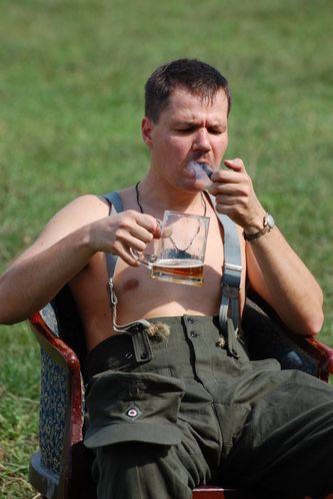Alcohol Abuse Among National Guard Veterans Linked To Stress After Return To Civilian Life; Unemployment, Divorce Contribute To Problem

Post-traumatic stress disorder (PTSD) is a major problem faced by veterans returning home after active service in the National Guard or Reserve troops. Combat experience and the emotional stress of having to live away from family and loved ones in dangerous war-zones takes a toll on the emotional well-being of a person. The already delicate psyche of the servicemen may get more battered if after returning to civilian life they get plagued by problems like job loss, divorce, and serious financial and legal problems and as an escape — they may turn to alcohol.
A study by researchers at Columbia University's Mailman School of Public Health, published online in the American Journal of Preventive Medicine, states that alcohol abuse is a major concern for soldiers returning home. While almost seven percent of Americans abuse or are dependent on alcohol, in servicemen this figure is almost double: 14 percent.
The study was based on interviews of 1,095 Ohio National Guard soldiers who had primarily served in either Iraq or Afghanistan in 2008 and 2009. The soldiers were interviewed telephonically thrice over a period of three years and asked about their alcohol consumption, exposure to deployment-related traumatic events and stressors like land mines, vehicle crashes, taking enemy fire, and witnessing casualties, and any stress related to everyday life since returning from duty.
Almost 60 percent of those interviewed said that they had experienced combat-related trauma, 36 percent had experienced civilian stressors, and 17 percent reported being sexually harassed during their most recent deployment. Among the group, 13 percent reported problems consistent with an alcohol use disorder in the first interview, seven percent during the second, and five percent during the third. Alcohol use disorder is defined as alcohol abuse or dependence — when a person’s drinking causes distress or harm.
The researchers found that sexual harassment, termed as military sexual trauma (MST) during deployment and the presence of a civilian stressor, increased the chances of alcohol use disorders. An important observation was that the stressors resulted in new cases of alcohol use disorders and did not affect people with a history of alcoholism. Combat-related traumatic events did not majorly contribute to alcohol problems.
"Exposure to the traumatic event itself has an important effect on mental health in the short term, but what defines long-term mental health problems is having to deal with a lot of daily life difficulties that arise in the aftermath — when soldiers come home," explained lead investigator Magdalena Cerdá, from the Mailman School of Public Health. "The more traumatic events soldiers are exposed to during and after combat, the more problems they are likely to have in their daily life — in their relationships, in their jobs — when they come home. These problems can in turn aggravate mental health issues, such as problems with alcohol, that arise during and after deployment."
In the past decade, more than 1.6 million service members have been deployed in the war zones of Iraq and Afghanistan. And one among eight of these soldiers had alcohol abuse counseling. While female veterans may not abuse alcohol as much as their male counterparts, reports have suggested that they abuse prescription drugs.
The study again reiterates what previous studies have highlighted — a successful reintegration and balanced civilian life are the keys to reducing the stress that may follow after veterans’ homecoming. It also suggests targeted intervention to help soldiers cope with PTSD without resorting to alcohol.
"Guardsmen who return home need help finding jobs, rebuilding their marriages and families, and reintegrating into their communities," said Karestan Koenen, senior author of the study in a statement. "Too many of our warriors fall through the cracks in our system when they return home. This is particularly true of Guardsmen who do not have the same access to services as regular military personnel. We need to support our soldiers on the home front just as we do in the war zone."
Source: Cerdá M, Koenen K, Galea S. American Journal of Preventive Medicine. 2014.
Published by Medicaldaily.com



























